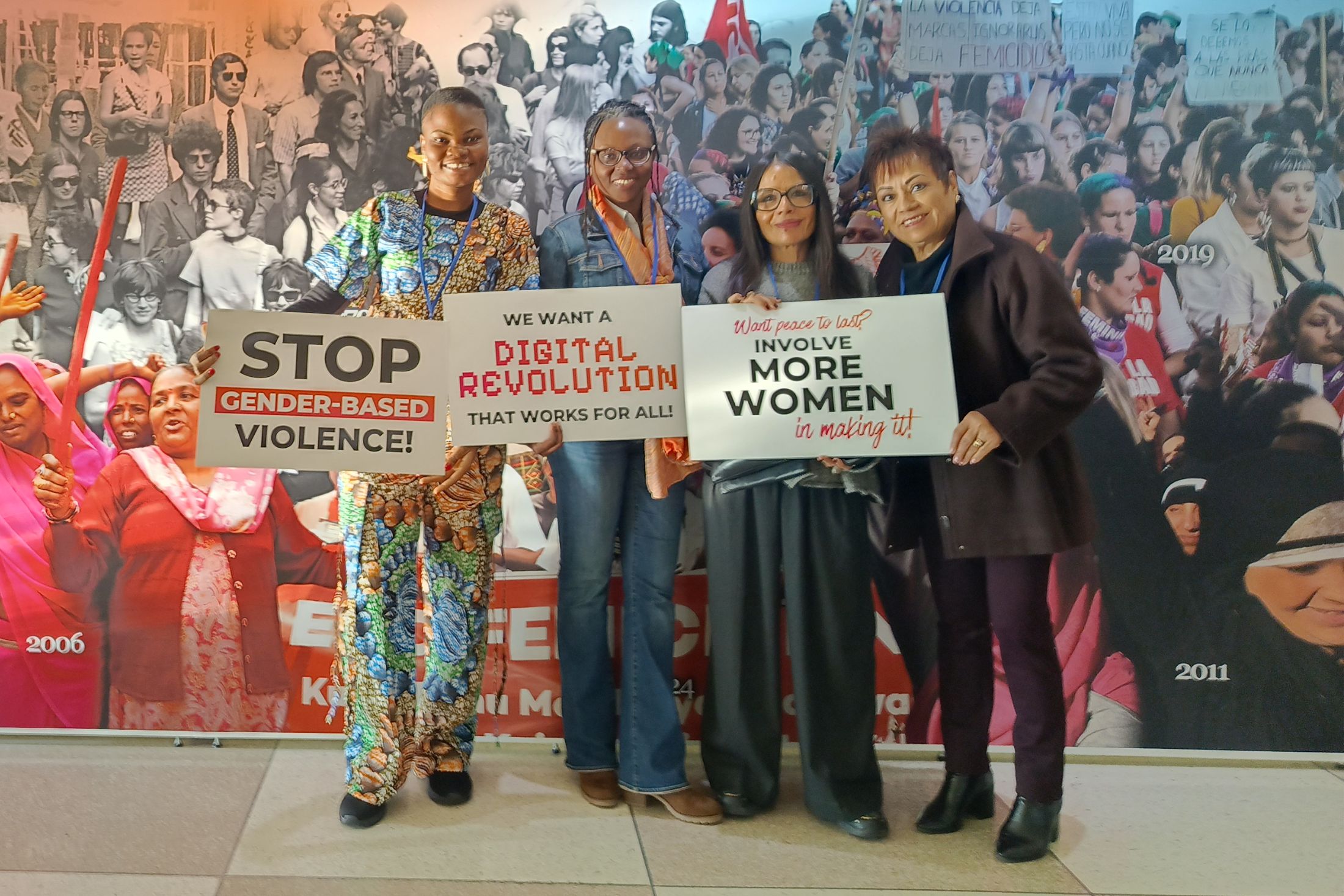
08 Apr Reflections from #CSW69: Women, diversity, and digital rights
Blessing Oladunjoye, project officer with GMMP Nigeria participating organization Journalists for Christ International Outreach, participated in the 69th session of the UN’s Commission on the Status of Women (CSW69) as a member of the WACC Global delegation. Here she reflects on her experience.
Even a toddler could tell the excitement that radiated in my heart as I packed my bags in preparation to attend the 69th Commission on the Status of Women (CSW69) in New York City. It was my first time in the United States and definitely my first time attending a global convening on women’s rights. I was engulfed with the feeling of “being arrived,” as we say in Nigeria about someone who has made an impact in their field of operations.
I was excited about the sessions that I would attend, the networks that I would build, the locations I would visit, the meals I would eat, without neglecting how to keep myself warm, considering the huge contrast to the Nigerian weather!
The journey began on March 8, and I started networking on my connecting flight from Amsterdam to New York when I met my seatmate Isra Lee, who leads Single Supermom, an organization promoting the rights of single mothers. I got an invitation to her session on March 13 at the UN Church Centre, and my excitement grew.
Once in NYC, I headed to the UN office to pick my badge. I needed to ensure that nothing would delay my active participation starting the next morning.
Considering my area of interest and focus, I mapped out sessions that focused on women’s communication rights and tech-facilitated gender-based violence (TFGBV). Sessions and great conversations were happening simultaneously, but I had to make a choice.
The TFGBV Trend
There were numerous impactful sessions, but the first I attended was titled “TFGBV and Gender Equality: Current Issues and TFGBV.” The session featured speakers from the Young Women Christian Association (YWCA) from different countries who shared how grooming, online harassment, AI biases, and digital censorship continue to silence women and girls.
Another session that stood out was “Cyberviolence: Protecting Women’s Dignity in Digital Spaces,” where the discussions explored the limited responses to tackling TFGBV as it has been trivialized when compared to physical GBV.
During the WACC Global and Global Alliance on Media and Gender (GAMAG) session titled “Section J at Beijing+30: Safeguarding Women’s Communication and Digital Rights,” I spoke about the findings of Journalists for Christ International Outreach (JfC) on TFGBV, and how it has affected women’s rights and access to information online.
I had the opportunity to present these research findings to the Global Media Monitoring Project (GMMP) network members and other women groups.

There were multiple sessions on TFGBV, which suggests that it has become a trend and there is a need to address it.
Some of the recommendations I gathered include:
- Block hate
- Digital wellbeing
- Protect your behaviour and interaction online
- Bring balance and boundaries to online engagement by taking control of your privacy online
- Digital platforms need to become more responsible to reducing TFGBV cases being perpetuated on their platforms
Cultural diversity and meaningful connections
CSW was not just about discussions—it was about meeting inspiring women who are leading change in their communities. From New Zealand to Mexico to Palestine to Vietnam to South Korea, and many more, I connected with journalists, activists, and policymakers working on gender justice, media freedom, and digital rights.
I also did not hesitate to visit the Nigeria House located at Kudirat Abiola Avenue, just a stone’s throw from the UN building, where I met with other Nigerians who are advancing women’s rights.
Each conversation exposed me to the amazing work that women are doing across the globe to fight for equality. Every moment was a learning experience and a reminder of why we must keep pushing for gender equality in digital spaces.
To experience diverse culture, I also explored different delicacies including Spanish, Italian, Korean, Japanese, Vietnamese and Indian cuisines. They tasted really great though nothing beat pounded yam and egusi–it was a taste of home in New York.
#CSW69 ends but the work continues
As I left CSW 2025, I carried with me renewed energy and commitment to advocating for safer digital spaces for women. TFGBV is not just an online issue—it is a human rights crisis that affects lives and limits voices. We need stronger laws, better tech accountability, and global collaboration to address this.
To all the incredible women I met—thank you for your wisdom, resilience, and passion! To those working in this space, let’s keep pushing forward. The fight continues, and together, we will win. To WACC that supported my participation in this gathering—thank you for supporting incredible work that enhances women’s communications rights globally.
Until the #CSW70 in 2026, let me continue to make impact within my space.
Top image: (l to r) Blessing Oladunjoye, GMMP Expert Group chair Sarah Macharia, GAMAG chair Amie Vega Montiel, participant from Mexico. Courtesy photo.

Sorry, the comment form is closed at this time.